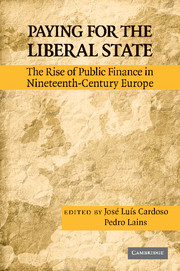Book contents
- Frontmatter
- Contents
- List of contributors
- Acknowledgments
- Paying for the Liberal State
- Introduction: Paying for the Liberal State
- 1 Creating Legitimacy: Administering Taxation in Britain, 1815–1914
- 2 The Development of Public Finance in the Netherlands, 1815–1914
- 3 The Apogee and Fall of the French Rentier Regime, 1801–1914
- 4 The Evolution of Public Finances in Nineteenth-Century Germany
- 5 Public Finance in Austria-Hungary, 1820–1913
- 6 The Rise of the Fiscal State in Sweden, 1800–1914
- 7 Always on the Brink: Piedmont and Italy
- 8 Public Finance and the Rise of the Liberal State in Spain, 1808–1914
- 9 Public Finance in Portugal, 1796–1910
- 10 Conclusion: The Monetary, Fiscal, and Political Architecture of Europe, 1815–1914
- Index
- References
1 - Creating Legitimacy: Administering Taxation in Britain, 1815–1914
Published online by Cambridge University Press: 05 June 2012
- Frontmatter
- Contents
- List of contributors
- Acknowledgments
- Paying for the Liberal State
- Introduction: Paying for the Liberal State
- 1 Creating Legitimacy: Administering Taxation in Britain, 1815–1914
- 2 The Development of Public Finance in the Netherlands, 1815–1914
- 3 The Apogee and Fall of the French Rentier Regime, 1801–1914
- 4 The Evolution of Public Finances in Nineteenth-Century Germany
- 5 Public Finance in Austria-Hungary, 1820–1913
- 6 The Rise of the Fiscal State in Sweden, 1800–1914
- 7 Always on the Brink: Piedmont and Italy
- 8 Public Finance and the Rise of the Liberal State in Spain, 1808–1914
- 9 Public Finance in Portugal, 1796–1910
- 10 Conclusion: The Monetary, Fiscal, and Political Architecture of Europe, 1815–1914
- Index
- References
Summary
Introduction
The notion of the state as a tax eater formed a central tenet in radical rhetoric in Britain after the Napoleonic Wars, when the British fiscal state was deeply resented and criticized, to a much greater extent than it had been in the eighteenth century. Trust was lost and needed to be rebuilt by the British political elite. During the eighteenth century, a powerful fiscal-military state emerged in Britain, without serious political problems and with a remarkable level of compliance from the public. The fiscal regime of eighteenth-century Britain can be understood in terms of the construction of two forms of trust. First, the supply of loans to the state at modest rates of interest depended on the ability of the state to make a credible commitment to lenders that they would not suffer from default and that their interest would be paid on time and in full. This form of trust in the credibility of the state is measured by an assessment of risk reflected in the interest rates on loans, which dropped as confidence grew in the ability of the state to commit (Epstein 2000). The second form of trust is more difficult to achieve: a high level of convergence between the purposes of the state and the interests of the political and economic elites.
- Type
- Chapter
- Information
- Paying for the Liberal StateThe Rise of Public Finance in Nineteenth-Century Europe, pp. 27 - 56Publisher: Cambridge University PressPrint publication year: 2010
References
- 5
- Cited by



